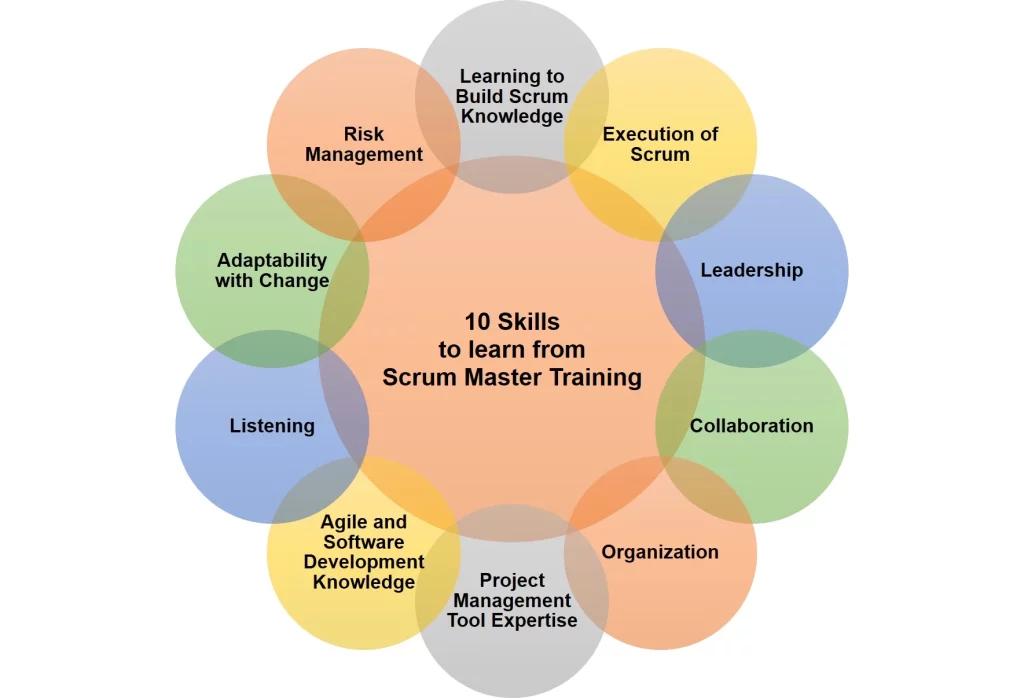10 Skills You Can Learn from Scrum Master Training


Introduction
IT specialists commonly use the highly preferred Agile approaches, and the foundation of agile development is the Scrum Master. Scrum is a framework for implementing agile processes in software development and other related tasks.
They assist in guaranteeing that everyone is working cooperatively and keeping everything orderly and on schedule. Making sure that everyone on the team is aware of what they are meant to be doing and when they are expected to be doing it is the primary goal of a Scrum Master.
Whether you want to improve your working abilities or raise your career, Scrum training is an excellent place to start. If you wish to further your career and take on management responsibilities, the Scrum Master certification will be of great assistance. You can enroll yourself in the best CSM Training to learn the necessary skills.
Who is Scrum Master?
A Scrum Master leads an agile team, deals with problems, and is in charge of the entire procedure. To guarantee a successful output, a Scrum Master coordinates all communication and teamwork between leadership and team members. They help the team comprehend and internalize the Scrum ideals and principles. They exert every effort on their end to ensure that the team operates at its peak.
The Scrum Master organizes meetings and makes sure that there are no obstacles hindering the project’s development. They collaborate with the product owner to ensure the product backlog is prepared for the next sprint. They are also known as team protectors.
In the process of developing a product strategy, the Scrum Master works in the background. The Scrum Master must have soft skills as well as a fundamental understanding of the most recent technologies and techniques since Agile processes depend on coordination and collaboration amongst the employees.
What are Scrum Master Skills?
Scrum Masters have a long list of duties; thus, having a certain set of skills is necessary for them to be fully effective. This set of important skills is divided into two categories: hard skills and soft skills.
● Hard Skills
Hard skills are the quantifiable, observable aptitudes that you may learn through learning or experience, and they serve as the foundation for all other skills. Before being prepared to be placed in this position of leadership, Scrum Masters must finish certain essential technical training.
Organizational Skills – Every effective Scrum Master is aware that their team’s success depends on the organization. It would be difficult to handle the intense levels of cooperation and communication required by Scrum without a defined structure and procedure in place. Only by meticulous planning and organization will the Scrum Master be able to guarantee that the team members have the time and space necessary to perform their best job.
In order to make sure that the team is consistently focusing on the most crucial activities, the Scrum Master must be able to prioritize tasks and assess conflicting requests.
Strong Knowledge of Scrum & Agile – The major goal of having a Scrum Master is to make sure that the team is actively adhering to the Scrum and Agile principles. Scrum Certification programs are widely available online, and they concentrate on the best ways to apply them to foster teamwork and success.
Deep comprehension of the Scrum ideals and a degree of skill above that of a standard project manager or team leader are both shown by becoming a Certified Scrum Master. The success of the entire team may be greatly impacted by receiving this kind of training.
The Scrum Master must be informed about the framework in addition to being able to explain things to the team in a straightforward manner and assist in resolving any issues that may occur.
Technical Expertise – The technical proficiency of a competent Scrum Master is crucial to the accomplishment of the project. Scrum Masters must be able to interact successfully with both the product and development teams and have a thorough grasp of the products they are working on.
They must also be quick to debug and pinpoint problems. A lack of these technical abilities may cause projects to be delayed or even fail completely. Hence, it is crucial for every aspiring Scrum Master to invest the time necessary to grow their technical skill set before assuming this responsibility.
● Soft Skills
Although a Scrum Master should have certain hard skills, it’s their soft skills that really set them apart from the competition. Making sure the Scrum process is successfully carried out is your duty as a Scrum Master.
To successfully organize Scrum ceremonies, offer to mentor and support for Scrum, and handle team disputes, these soft skills must be strong.
Effective Communication Skills – Success in every sector depends on the capacity for excellent interpersonal communication, but Scrum Masters require this skill more than anybody else. The Scrum Master is in charge of fostering communication among team members and stakeholders in their capacity as the team’s leader. They must be able to handle disputes, give assistance to team members, and properly explain the Scrum methodology.
In order for the team to be successful, the Scrum Master has to be able to communicate clearly and establish strong bonds with each member. Without these abilities, team leaders can have a hard time inspiring their colleagues to work towards the team’s goals.
Time Management – Helping the team maintain focus and direction is one of your most crucial responsibilities as a Scrum Master. The team can maintain focus and utilize their time more effectively thanks to the time management abilities of a skilled, safe Scrum Master.
You may assist the team in avoiding expensive delays and maximizing output by keeping them organized and on time. You may play a crucial part in making sure your project is successful by maintaining organization and keeping the team on task.
Ability to Coach & Teach – The appropriate implementation of Agile systems is a key component of the Scrum Master’s role in the team. Strong teaching abilities are also required, especially for teams that are new to the Scrum approach. A great Scrum Master must be not only aware of what to do but also be able to communicate the why and how to all parties involved.
A coach may assist Scrum Teams in realizing their full potential by offering direction and encouragement. You must have a thorough grasp of the Scrum framework and be able to use its principles in various circumstances if you want to be a successful coach.
10 Skills You Can Learn from Scrum Master Training


Learning to Build Scrum Knowledge
To be a successful Scrum Master, learn the fundamental principles and values of Scrum. Scrum is built around three pillars: adaptability, openness, and inspection. Also, the framework is based on five values: concentration, openness, dedication, respect, and bravery. To be competent in Scrum, one must be familiar with the following ideas and tasks:
- Daily Scrum
- Increment
- Sprint
- Sprint review
- Definition of done
- Development team
- Product Backlog
- Product owner
- Sprint Retrospective
- Timeboxing
Execution of Scrum
The framework skill of Scrum Masters is required. You may use Scrum in real-world situations and demonstrate your understanding of it by earning a certification. Depending on your work and expertise level, select a certification path. The basics of the Scrum framework are covered by the basic certification.
An experienced Scrum Master could choose to pursue higher certification to demonstrate their capacity to apply knowledge to companies and projects that are more complicated. A course may be required by some certification organizations before the test.
To earn the certification, candidates must pass the certification tests offered by the two major certifiers.
Leadership
The Scrum Master serves as the liaison between the development team and the product owner. Success depends on the Scrum Master’s and the product owner’s relationship. The generation of user stories is the product owner’s responsibility. Once these stories have been finalized, estimated, and prioritized, the full Scrum team examines them.
Story refinement, also known as backlog grooming, is completely supported by the development team, according to the Scrum Master. The product owner handles issues with the product and adjustments to feature priorities. The Scrum Master notifies the development team of product changes to help the product owner.
By being an effective leader, the Scrum Master aids the product owner. The Scrum Master:
- holds the Scrum team responsible for achieving the established sprint goals;
- effectively manages the product backlog;
- aids the Scrum team’s comprehension of anticipated product backlog items and story grooming;
- maximizes value by organizing the product backlog;
- supports Scrum events.
An effective leader is prepared and speaks clearly. Scrum Masters are responsible for fostering agreement within their organizations. Develop your leadership abilities through practice. Outside of your employment, assume a non-technical leadership position. Consider participating in community service projects like coaching a young athletes’ team.
Collaboration
The duties of Scrum Masters go beyond the teams on which they work with developers. Scrum Masters work together with stakeholders and other dev teams to remove obstacles for their teams. Use your leadership abilities as a Scrum Master to coordinate efforts amongst teams, work out scheduling issues, and conduct technical meetings.
Organization
Scrum teams need structure and planning; thus, the role of the Scrum Master is to guide a process and keep everyone on track. Team management abilities must be strengthened for the Scrum Master. The team agreement, also known as the team operating procedure, is a document that outlines the team’s fundamental working hours, Scrum ceremony forms, escalation pathways, and stakeholder participation. The agreement is an evolving document; therefore, the team should adjust as needed. These rules should promote openness between different personalities and job responsibilities.
Collaboration with the product owner on the product backlog requires strong organizational abilities as well. The Scrum Master ensures the team completes its tasks and that the overall feature is on schedule for delivery.
Project Management Tool Expertise
The use of task boards for project management, as well as collaboration and documentation technologies, such as calendars, requires sophisticated expertise from Scrum Masters. Scrum teams’ main means of managing, organizing, and tracking work is through task boards.
Teams must be able to assess the status of the sprint and the project as a whole by looking at the task board. The task board should be set up, procedures should be established, tasks should be moved, and the Scrum Master should assist team members in moving tasks correctly.
Agile and Software Development Knowledge
Fundamentally, Scrum aids in the adaptive product creation of software development teams. Scrum Masters may assist teams in advancing with the right tools and approaches by having a technical understanding of how to create software in an Agile setting.
The technical product that is being developed, as well as the set of development tools, should be familiar to Scrum Masters. A software developer is not necessary to be a Scrum Master. To properly manage the Scrum project, it is necessary to comprehend the technical characteristics and use cases of the product.
Listening
Being a good leader begins with listening well; take the servant leader role as an example. One essential Scrum Master ability is listening. Attend the daily standups, backlog meetings, sprint planning, team review, and retrospectives with attentive attention. Find out where problems occur, make them more visible, and guide the team to a solution.
Adaptability with Change
Many Scrum Masters obsess about adhering to the framework. Consider Scrum as a fundamental tool as opposed to the end result. The idea of change, as well as the framework and procedures required to handle change, are at the heart of agile development.
As a result, the Scrum framework needs to be modified to better serve the team. Each team follows the Scrum rituals, yet each one operates uniquely.
Risk Management
It is important for the Scrum Master to be knowledgeable about common risk management practices. All facets of that approach, including risk assessment, mitigation, and monitoring, may benefit from their assistance. Certain dangers are connected to procedures, technological debt, or abilities. A specific amount of debt is accepted for each project.
Task-impeding problems, however, can occur throughout development. The Scrum Master assists in spotting risks and collaborates with the development team to assess, categorize, and communicate them. This skill helps the product owner and other stakeholders select the appropriate course of action to lessen or limit the risk.
How to Improve Scrum Master Skills?
To succeed as a Scrum Master, use the following strategies to enhance and expand your technical skills:
Continue Your Education
Consider enrolling in Scrum methodology courses, particularly those that concentrate on the integration and development of Scrum techniques. You may improve your understanding of the essential leadership skills required for the position by taking online Scrum project execution courses.
Get the Certification
To strengthen your knowledge and showcase your abilities, you can also work for certification in core competence. Although certification is not necessary to obtain experience managing Scrum teams, certain companies might prefer individuals to have certifying credentials to show their proficiency in the job.
Connect with Subject-Matter Experts
Make connections with experts who have led Scrum teams, worked on Agile projects, and have influence in the industry. You may better comprehend other viewpoints on leadership and managing your Scrum duties by expanding your network of resources for learning.
Conclusion
In order to properly manage the sprints for your team, a Scrum Master must have a solid understanding of the agile approach and know how to put it to use. Nevertheless, it is only the beginning.
To succeed in this position, you must also possess abilities in problem-solving, communication, and dispute resolution. The all-inclusive CSM® Training might be useful if you’re trying to get experience as one or just enhance your skill set.




